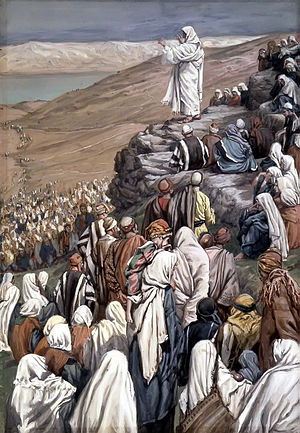 Image via WikipediaDISCIPLING
Image via WikipediaDISCIPLINGA chance to see what Jesus expects in his disciples, from those who were the
disciples He taught PERSONALLY; through simulated (Apostles) & (Jesus) biblical conversations.
ON THE ROAD TO GALILEE AFTER THE RESURRECTION
Eleven disciples walking
PETER (talking to his brother Andrew) Andrew, remember
when Jesus called us to be "fishers of men"? I don't know about you; but I'm
sure, I didn't fully understand what he meant at that time. That we would be
leaving our old life of fishing and go into, helping others find God. We are
going to need to practice Christ's teachings and share the gospel with others.
We will be able to draw them to Christ like we, as fishermen, pulled fish into
the boat with nets" Remember how Jesus had talked to us before he called us to
follow him? As we got to know him, our appreciation for what he was saying grew.
The more people that get to know us, the better chance we have to help someone
to get to know our Lord, Jesus. They will also appreciate what we have to offer
them, peace, love, etc. Although they may appreciate it fairly quickly, it will
probably take years for them to fully understand and experience their faith. I
guess, even now, we don't even fully understand or appreciate it, until we live
it. When we first met Jesus, did you realize at the time that He was pointing
the way to a new life? I certainly didn't. Did you notice how he asked us, "What
do you want?" He didn't just want us to follow him, because it was the thing to
do. We needed to examine our motives for following him. I guess the question was
really: "Were we seeking His glory or ours?
ANDREW Well when I came to get you,
I was sure that Jesus was the Messiah. Remember how excited I was. I just wanted
to tell everyone.
PETER You sure did. But you noticed, I hope that Jesus changed
my character by giving me a new name. But to get back to our calling; we knew
what kind of man he was, a radical, and I guess we sorta knew that he would
change our lifestyle, radically. You know, we have to remember that it took
years for us to grow to where we are now , spiritually. And even when Jesus
called us, he didn't do it at once. It took us time to resolve our questions;
and to build up our resolve. I guess the important thing was; that once we
started following Jesus, we never stopped. We must not push the people we work
with, but concentrate on making sure that any new disciples "keep on following
him." (Peter talking to the group of 11) You know, one thing that always
bothered me; was that Jesus chose US out of the hundreds that followed him over
time. He certainly didn't choose us because of our strong faith, because mine
certainly failed often. And he certainly didn't choose us because of our talent
and ability. Any of you guys, have any special abilities? I know, none of you,
have any special leadership skills. Or you would have stepped forward, and taken
over from me. I haven, done a very good job.
ANDREW (responding) You know what I
think, why we were chosen? Jesus must have knew that we would obey him. And I
guess that we were willing to follow him with a willing heart.
MATTHEW
(responding) Yes, I also noticed that we came from all walks of life. I guess
that God can use anyone, no matter how insignificant he or she appears. I guess
that Jesus prefers to start with ordinary people, and grow his own disciples.
His "experience grown disciples, seem better able to do his extraordinary work.'
JOHN (responding) "Matthew, your right. I also noticed how we underestimated
Jesus. We saw his miracles and yet we didn't recognize, how he could change us."
And you know, what I had a problem with also; was that I tended to want to feel
important, proud and possessive. He did give us prestige, and also opportunities
for receiving money and power. But I seemed to keep seeing, in Jesus' eyes a
tear, every time any of us got close to that. You know, like Judas."
PETER Yes,
I noticed that too. Like when Jesus drew us as aside on that mountain and warned
us after we started to prance around and give orders and find the best seats. I
remember: "Blessed are the poor in spirit, for theirs is the kingdom of heaven.
Blessed are the meek, for they will inherit the earth." Or when he said:
"Blessed are the pure in heart, for they will see God." If I only really
understood it then; that as Jesus' disciples we can expect mourning, hunger, and
persecution. I guess we can't expect much reward till we get to heaven. Jesus
wanted us to avoid fame and fortune, so we wouldn't promote our personal
interests, but His only. YES, and remember that day on the lake when i was
trying to show you guys up, with my faith; by walking on the water. Well I
panicked in the storm. But you guys also panicked in a storm, when Jesus was in
the boat with us. And we panicked even though we were doing something we were
experienced at and we knew Jesus could perform miracles. I guess we really
didn't believe yet that Jesus was God. Jesus' power that calmed the storm can
also help us deal with the problems we face. Jesus was willing to help if we had
only asked him. We should never discount his power again, even in terrible
trials.
ANDREW You know Peter, you were speaking of leadership skills earlier.
You should us Jesus' approach. He gave us power to do our job. He gave us
specific instructions so we knew what to do. Remember, "Take nothing for the
journey - no staff, no bag, no bread, no money, no extra tunic. Whatever house
you enter, stay there until you leave that town." Jesus told us how to deal with
tough times, "If people do not welcome you, shake the dust off your feet when
you leave their town, as a testimony against them." And he held us accountable.
You might want to try it.
PETER You are probably right. We should probably
include sending the disciples out in pairs. They could strengthen each other,
especially when they face rejection. And even though Jesus may give us power,
teamwork will also."
ANDREW Good. But lets go back a moment to what you were
saying about the storm. You were right about us not believing Jesus was really
the son of God. I think it was for multiple reasons. The first being that we saw
him as another human. And I know for me, it included; how could Jesus pick me,
just an ordinary human. I think, that I had trouble remembering that being God,
he was more interested in his glory and his will being done, then answering to
my wants. I think I had trouble connecting Jesus' power (as example feeding the
5,000 and walking on water) to my life. Even with all of that, I still couldn't
believe that he would care, and even more, act in my life. But he did. I guess,
that is what experience does for us.
JOHN Right. That boy with the fish, was a
good example. If we only have looked at; that Jesus usually preferred to work
through other people. There he took what a young child had to offer and used it
to get thee job done. We must never think age, young or old, is a barrier to
being used by Jesus. And you know, we probably had even more resources than that
boy's fish; but all we seemed to be able to concentrate on was, that we didn't
have enough, so we didn't want to use what we had. The boy gave what little he
had, and it made all the difference. If we offer nothing to God, he will have
nothing to use. But he can take what little we have and turn it into something
great.
PETER Yes. You know what would help us do that, is to keep praising God
for what we do have, from our breath to our clothes. This will help us remember
all Jesus does for us, and then it will be natural for us to expect Jesus to
help. Faith is a mind-set that EXPECTS God to act. When we do this, we can
overcome our fears. And you know; that same approach could help us respond to
others needs. I am still embarrassed by that time we wanted to get rid of that
women who had the demon. If we only remembered all the times Jesus helped
others. It is easy to become so occupied with spiritual matters that we miss
real needs right around us. Especially if they cause us inconvenience or they
are not the right people. Instead of being bothered, we should be aware of the
opportunities that surround us. We should also be open to the beauty in God's
message for ALL people, and make an effort not to shut out those who are
different from us.
ANDREW You are right, but remember that Jesus warned us, to
be careful to be sure that the people we work with fully understand who Jesus
is, their Savior AND Lord. And we can only do that if WE fully BELIEVE that
first. And that will help us, help others in dealing with suffering. Often their
most difficult temptations could come from us trying to protect them from
discomfort. You know something like, "Surely God doesn't want you to face this."
We or they do not know what God's will is or what is better for HIS glory. We
and they must just trust and believe.
This is the end of Scene 1
SCENE 2 -
SITTING TOGETHER IN A GROUP
Sitting ANDREW Let's take a break.
PETER (Sitting
down in a group) Ok, I wanted to ask the group anyway, if they were like me,
having trouble understanding Jesus' mission.
Did you guys have trouble understanding what Jesus meant when he said, "Don't
tell anyone what you have seen, until the Son of Man has been raised from the
dead." I know when I joined in asking him, "Why then do the teachers of the law
say that Elijah must come first?" That I was showing that I didn't have a clue
on what he was saying.
I now realize; that he was predicting his death and resurrection. But I think
part of my confusion, was in trying to understand why Jesus wanted to go to
Jerusalem, if he thought he was going to die. But I guess we were very slow in
understanding Jesus. I mean we were there and saw the miracles and yet it took
us along time. We certainly can't expect more from our disciples.
JAMES
Responding Well I've started to realize that only through dying, Jesus could
show his power over death and his authority to be King over ALL things.
PETER
I now know you are right, but at that time I didn't believe it. That reminds me of
another time when our unbelief got us in trouble with Jesus. Remember when we
were unable to drive out the demon, and then we asked Jesus why. He sure pointed
out our lack of faith by saying, "O unbelieving and perverse generation, how
long shall I put up with you?" And then he went on to say, "Because you have so
little faith. I tell you the truth, if you have faith as small as a mustard
seed, you can say to this mountain, `Move from here to there' and it will move.
Nothing will be impossible for you."
I guess we were trying to drive out the demon with our abilities instead of
having any faith in God doing it. There is great power in even a little faith
when God is who we are trusting, to produce results. ANDREW Interrupting That is
no doubt part of the reason why Jesus had to take so much time to train us,
instead of preaching to the multitudes. He knew how important it was to equip us
to carry on when he returned to heaven. Deep spiritual growth isn't instant,
regardless of the quality of experience or teaching. We have to be sure to give
our disciples that same time.
PETER I think we became to preoccupied with the
organization of Jesus' earthly kingdom; that we lost sight of the need to
concentrate on learning from Jesus. I now realize that if we had sought a place
of service, instead of positions of advantage, we would have been more willing
to learn. It sure was difficult to identify with "children" - and become weak
and dependent people with no status or influence. Responding
ANDREW Yes, we
often take all of what Jesus has taught us for granted. Because we are
privileged to know so much about Christ, we must be careful to follow him. We
need to remember; that with privilege comes responsibility.
PETER Jesus sure
warned us against hypocrisy - trying to appear good when one's heart is far from
God. Each of us must resist the temptation to settle for the appearance of
respectability when our hearts are far from God.
I think that was part of why we all got upset with James and John for trying to
grab the top positions. But Jesus taught us that the greatest person in God's
kingdom is the servant of all. Authority is given not for self importance,
ambition, or respect, but for useful service to God and his creation. Responding
JAMES Your right, but in my defense, we all had the wrong idea of Jesus'
kingdom. But Jesus' kingdom is in the hearts and lives of his followers.
Responding
JOHN Yes, we were more concerned about ourselves and how if Jesus
would die or went away; what would become of us.
PETER Yes, well we all declared
that we would die before disowning Jesus. But a few hours later, however, we all
scattered, except for John. Talk is cheap. It is easy to say we are devoted to
Christ in the good times, but our claims are meaningful only when we are tested
in the crucible of bad times.
JOHN Well we all have been guilty of denying that
Christ is Lord of vital areas of our lives or of keeping secret our identity as
believers in times of pressure.
Well I know I'm not excusing myself by pointing at others whose sins seem worse
than mine. Instead, I need to come to Jesus for forgiveness and healing.
I'm sure that Jesus did not wash our feet just to get us to be nice to each
other. His far greater goal was to help us be humble when we were serving God,
serving others, and reaching out to all people who need the message of
salvation.
PETER I'm sure that I, of all people needed to hear that. But I am
also glad that Jesus forgave us, even after we had disowned and deserted him. I
know, because of that forgiveness, I can love him even more.
SCENE 3 The eleven
disciples reached the mountain where Jesus had told them to go. When they saw
him, they worshiped him: but some doubted. Then Jesus came to them and said,
JESUS All authority in heaven and on earth has been given to me. Therefore go
and make disciples of all nations, baptizing them in the name of the Father and
of the Son and of the Holy Spirit, and teaching them to OBEY everything I have
commanded you. And surely I am with you always, to the very end of the age. When
someone is dying or leaving us, his or her last words are very important. Jesus
left the disciples with these last words of instruction: they were under his
authority; they were to make more disciples; they were to baptize and teach
these new disciples to obey Christ; Christ would be with them always.
Jesus is Lord of the earth.
We are to go - whether it is next door or to another country - and make
disciples. It is not an option, but a command to all who call Jesus "Lord." We
are not all evangelists in the formal sense, but we have all received gifts that
we can use to help fulfil the Great Commission, As we obey, we have comfort in
the knowledge that Jesus is always with us.











